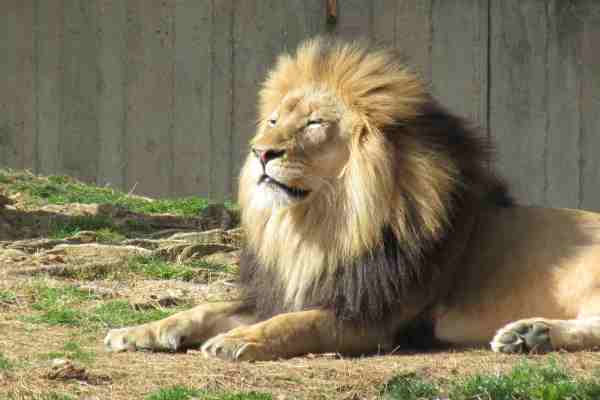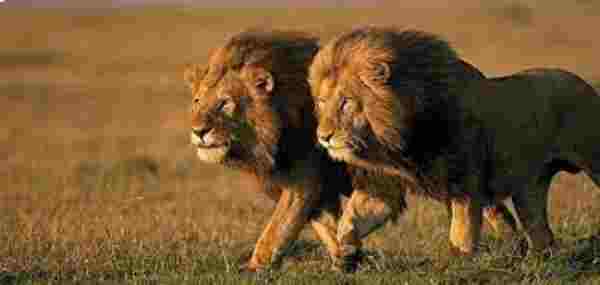As the ultimate symbol of strength and power, lions have always fascinated humans. However, their ferocity and unpredictable nature often overshadow their social behaviour and relationships. Are lions truly loyal to their pride, or do they prioritize their own survival above all else? This is the question that has puzzled researchers and animal lovers alike.
Table of Contents
But fear not, as we unveil the truth about lion loyalty. Through our exploration, we will delve into the intricate social system of pride, understanding the dynamics between individual members and the importance of each role.
We will also examine the interactions between humans and lions, asking ourselves whether loyalty can be earned between two very different species. So, join us on this journey into the heart of lion country, as we uncover the mysteries that lie beneath the roar.

Are Lions Loyal?
Lions, as social creatures, are renowned for their loyalty and dedication to their pride. Female lions, in particular, exhibit remarkable loyalty by remaining with the same pride throughout their entire lives. On the other hand, male lions typically depart from their birth pride after a period of 3-5 years to establish their own territory.
Here are the key points to remember:
- Lions are social animals and prioritize loyalty within their pride.
- Lionesses often display lifelong loyalty to their pride.
- Male lions generally leave their birth pride to establish their own territory.
- Lions practice polygamy and do not exhibit sexual loyalty towards a single mate.
- In captivity, lions have the capacity to form bonds with their human caretakers.
Are Lions Loyal to Pride?

A pride of lions constitutes a family unit comprising 2 to 40 members, consisting of an alpha male, several other males, numerous lionesses, and their cubs.
Loyalty forms a solid foundation within the pride of lions. The lionesses play a vital role in the pride, taking charge of raising the cubs and engaging in group hunting.
While not directly involved in parenting, male lions demonstrate unwavering dedication to defending the cubs and safeguarding pride by warding off potential threats.
Both lionesses and lions remain loyal to their respective pride for as long as they are part of them. In times of abundant food, lionesses often commit their entire lives to the same pride. However, young male lions eventually depart from their birth pride to establish their own. Typically, this occurs when they reach the age of two or three and are prepared to assume leadership of their own pride.
When a young nomadic lion takes over a new pride, it engages in a fierce battle with the reigning male alpha, competing for dominance and control over the family. The victor claims the females, and in many cases, eliminates the offspring of the defeated alpha to solidify its position.
Male lions typically remain in pride for a period of 3 to 5 years, until they are no longer capable of siring new cubs or until they are replaced by a stronger male.
Interestingly, the initial belief that the social structure of lions evolved primarily for the purpose of group hunting has been debunked. Instead, the true reason behind their social grouping is the acquisition of valuable territories, which are predominantly concentrated around crucial resources in the wild.
Access to shelter, food, and water plays a pivotal role in defining the worth of lion territories. Larger pride have a higher likelihood of claiming these desirable areas.
Are Lions Loyal to Their Mate?

Lions are known for practising polygamy, which means they engage in multiple mating partners throughout their lives, indicating a lack of sexual loyalty toward a single mate.
However, male lions do exhibit a level of loyalty when they stay with lionesses that are in heat. During this period, the pair remains together for several days, engaging in mating sessions every 15 to 30 minutes. The male lion assumes the role of protecting the female from other males who may attempt to mate with her.
Although lions may not adhere to monogamy or mate for life, they do demonstrate a certain level of loyalty to their chosen mate. Within a pride, lionesses are typically associated with one or two males, depending on the pride’s structure. In contrast, males have the opportunity to mate with multiple females.
Lions do not have a specific mating season, as they are capable of breeding throughout the entire year. Male lions reach sexual maturity around the age of three, while female lions can give birth to cubs starting at the age of four.
In the context of pride dynamics, mate selection among lions generally occurs without intense competition among the males, indicating a relatively harmonious process.
Are Lions Loyal to Their Owners?

Many lion enthusiasts have fantasized about owning a pet lion at some point. The allure of their charm and social behaviour is undeniable. However, it is crucial to understand that keeping a big cat in one’s backyard is an unwise decision.
While domesticated lions can form bonds with their caretakers and perceive them as part of their pride, it is essential to recognize that lions are not among the most loyal animals due to their inherent wild predatory instincts.
You might have come across the remarkable story of Christian the lion, which has touched the hearts of animal lovers worldwide. Christian was born and raised in captivity and, despite his wild nature, developed a profound bond with his human owners. As Christian matured, the owner faced the challenging choice of releasing him into the wild to live freely in his natural habitat. However, the tale does not end there.
Several years later, Christian’s former owner could not resist the urge to reunite with his old friend. Filled with anticipation and apprehension, he ventured back into the wilderness where Christian had been set free. The moment of their reunion was captured on video and has since become one of the most heartwarming animal stories ever told. It serves as a testament to the deep emotional connections that can form between humans and even the most formidable of creatures.
Unfortunately, not every story unfolds as a love story, and not all captive lions exhibit friendliness towards humans. Tragically, there have been instances where so-called “tamed” lions have attacked and even killed their human caretakers. It is crucial to remember that lions are wild animals, and their behaviour remains unpredictable. While they may exhibit signs of affection and loyalty towards their owners, a single moment can have devastating consequences.
How Do Lions Show Affection?
Lions exhibit their affection in diverse ways. An examination conducted at the Tokyo Zoo, focusing on captive lions, revealed that displays of affection played a crucial role in fostering faster bonding and strengthening the entire pride.
Studies have indicated that male lions predominantly express affection through head rubbing. Conversely, an overwhelming 97% of lionesses favour licking as their primary method of demonstrating affection.
Additionally, there are various other ways in which lions exhibit their affection, including:
- Purring
- Tail quivers
- Running to greet
- Chuffing
- Mutual grooming
FAQs
Do lions protect their mates?
Yes, lions do protect their mates. In a lion pride, both male and female lions show protective behaviour towards their mates. Male lions are known to defend their pride, including their female mates and offspring, from external threats such as rival males or other potential dangers.
Do male lions choose their mates?
Male lions do not typically choose their mates in the same way that some other species do. In lion pride, it is the lionesses who have a greater degree of choice in selecting their mates. When a new male takes over a pride, he will often mate with the resident lionesses. However, it is ultimately the female lions who decide whether or not to accept the male as a mate.
Do lions mate with their own pride?
Yes, lions do mate within their own pride. In fact, it is common for mating to occur between male and female lions within the same pride. Lion pride typically consist of one or more adult males and several adult females, along with their offspring.
Are lions protective of their pride?
Yes, lions are highly protective of their pride. The pride, which consists of related lionesses, their cubs, and a few resident males, is a tightly-knit social unit. Lions exhibit strong bonds within the pride and work together to ensure the safety and well-being of their members.
Reference:
- https://www.wildandfreefoundation.org/wff-logbook-blog/how-do-lion-prides-work
- https://lionalert.org/lion-reproduction-offspring/
- https://wilderness-society.org/even-lions-love-humans/

Rahul M Suresh
Visiting the Zoo can be an exciting and educational experience for all involved. As a guide, I have the privilege of helping students and visitors alike to appreciate these animals in their natural habitat as well as introducing them to the various aspects of zoo life. I provide detailed information about the individual animals and their habitats, giving visitors an opportunity to understand each one more fully and appreciate them in a more intimate way.









